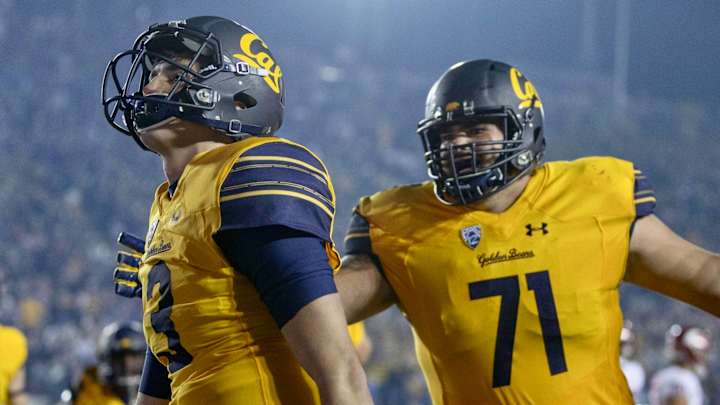Cal Football: Seeds of Pac-12 Players' Threat to Opt-Out Were Planted in Berkeley

Senior offensive tackle Jake Curhan says initial discussions among athletes at Cal that focused on COVID-19 quickly grew into a larger conversation about racial justice.
“We started talking to some of our teammates, and they said, ‘What about the Black Lives Matter issue? We don’t want to detract from their issue,’ “ Curhan said in an interview with Bomani Jones for The Undefeated in a story that appears on the ESPN website.
“The more we started talking with them, it became clear the two were the same issues.”
Curhan describes the early dialogue as involving offensive line-mate Valentino Daltoso and cross country runner Andrew Cooper, a graduate transfer from Washington State who served as president of Cal’s student-athlete advisory committee.
Those early conversations have turned into a movement within the Pac-12 Conference that is gaining momentum.
A group reportedly larger than 100 athletes from throughout the Pac-12 announced a wide-ranging list of demands in a document published Sunday on The Players Tribune. The football players say they will opt-out of fall camp (set to begin Aug. 17) and games (opening day is Sept. 26) unless the Pac-12 agrees to address issues that include COVID-19 health safety, social injustice, long-term health insurance and .
In the story in The Undefeated, Curhan stresses that he, Daltoso and Cooper do not consider themselves leaders of the player movement, but the story also said “the organization of the players started with them.”
Defensive back Josh Drayden also is listed as a spokesperson for the #WeAreUnited” player group, although he is not quoted in The Undefeated story.
Daltoso, who is Curhan’s roommate, said he questions how safeguards are being developed for athletes during the coronavirus pandemic.
“The same ones handling these regulations are the ones set to make millions if we play,” Daltoso said. “If our health and safety was No. 1, we wouldn’t be on campus.”
The ESPN story said every player interviewed stressed he wants to play this season and hopes not to be viewed as greedy “but believe what they’re doing and saying is right.” Curhan said Cal coach Justin Wilcox told him he supports players trying to improve their situation and won’t hold it against them.
That may not the case at Washington State, where first-year coach Nick Rolovich made comments to wide receiver Kassidy Woods that did not sound understanding.
“The basis of the movement is not resentment, but awareness and an unprecedented level of conversation across teams, spurred by COVID-19,” Jones wrote.
The important perspective Cooper brought to the others stemmed from his time at WSU after quarterback Tyler Hilinski committed suicide in 2018. Cooper was attending a Pac-12 council meeting and listened to a speech on mental health, given by Kate Fagan, author of “What Made Maddy Run,” which chronicled the mental health issues of Madison Holleran, a distance runner at Penn. Holleran committed suicide.
Cooper found the presentation fascinating, but said he surveyed the room and noticed not everyone felt that way.
“I’m looking around and some of these [athletic directors] are typing on their laptops,” Cooper told The Undefeated. “And I said, ‘Oh, OK, no one’s trying to change anything.’ Athletes care so much that we create initiatives on top of being overwhelmed.
“Through being in the rooms, I learned that systemic change will not happen within the system.”
Curhan got a dose of that early in July when he began texting friends on teams elsewhere in the Pac-12 to see how their athletic departments were structuring safety standards for athletes. What he heard was that there was no uniform approach to health safety.
“I think we’re doing pretty well at Cal,” Curhan told the website. “The fact we’re going to have to play these other schools? A little unsettling.”
The scope of the players’ concerns grew quickly. During a Zoom call that involved at least one athlete from every Pac-12 school, issues beyond COVID-19 and social injustice also bubbled to the surface. And the conclusion, Daltoso said, is that they’re all connected.
“When these schools talk about ‘black lives matter,’ it’s kind of ironic,” Daltoso said. “The system they profit off of is exactly the opposite of that. It’s divesting all these guys’ rights.
“Coronavirus is the most pressing issue of the moment, but it’s just put a spotlight on how college athletics works,” he said. “They rely so heavily on us to bring this money in, and we don’t see a penny of it.
“End of the day, this is about money, and we’ve got to get paid.”
Cooper said the player movement now involves between 200 and 300 athletes.
Curhan grew up in Larkspur, a Marin County community where the median household income is close to $100,000 and the median home price is $1.7 million. He knows everyone is not so fortunate.
“We have teammates who have kids. They’re struggling to get by on the stipend check we get. We have teammates who send whatever money they have left back home because their families need it more than they do,” Curhan said.
“The Pac-12, in the last four years, they’ve increased revenue by $200 million. It’s not like everything has gotten $200 million more expensive. Where is this money going?”
.
Follow Jeff Faraudo of Cal Sports Report on Twitter: @jefffaraudo
Click the "follow" button in the top right corner to join the conversation on Cal Sports Report on SI. Access and comment on featured stories and start your own conversations and post external links on our community page

Jeff Faraudo was a sports writer for Bay Area daily newspapers since he was 17 years old, and was the Oakland Tribune's Cal beat writer for 24 years. He covered eight Final Fours, four NBA Finals and four Summer Olympics.